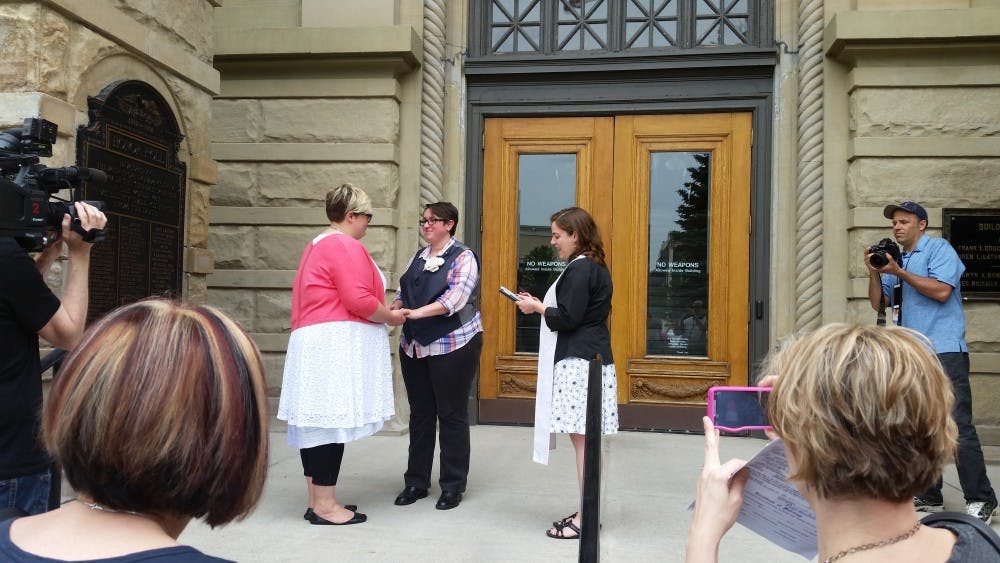While the historic Supreme Court ruling on June 26 was a big victory for members of the LGBT community, there is still a lot to be done in Michigan according to lawmakers in order to make Michigan a truly accepting state— but lawmakers differ on what direction Michigan should go.
While 39 cities throughout Michigan, including East Lansing, already have some form of nondiscrimination ordinance in place that prohibits discrimination based on sexual orientation in either housing, employment, public accommodations/services or some combination of those — Michigan has not made these adaptations yet.
Currently, Michigan’s only protection against discrimination in employment is that employers in the public sector cannot discriminate based on sexual, but there is no law against companies in the private sector discriminating based on sexual orientation.
Michigan is one of 28 states without a law prohibiting discrimination in housing based on sexual orientation, and one of 29 states without a law prohibiting employment discrimination based on sexual orientation, according to the Humans Rights Campaign.
“We have an anti-discrimination, civil rights act in Michigan that does not extend protections to the LGBT community,” state Rep. Jeremy Moss, D-Southfield, said.
The act Moss is referring to is the Elliott-Larsen Civil Rights Act, which currently prohibits discrimination based on religion, race, color, national origin, age, sex, height, weight, familial status, or marital status in housing, employment and public accommodations/services.
East Lansing city council members Kathleen Boyle said extending the Elliott-Larsen Civil Right Act protections to the LGBT community is the next logical step for Michigan.
“I think that it should be amended, I think that’s the next step,” Boyle said. “I think that (sexual orientation) is an important protection that needs to be clarified under the act.”
Moss said that Michigan really needs to catch up to not only the Supreme Court’s ruling that same-sex marriage is constitutionally protected and members of the LGBT community deserve equal rights, but also to the public’s opinion, which he said is becoming increasingly less discriminatory.
State Sen. Curtis Hertel Jr., D-East Lansing, said that not expanding the Elliott-Larsen Civil Rights Act is only holding Michigan back from becoming a welcoming state.
“Michigan is still far behind the times, on the wrong side of history on this issue, and while marriage is a wonderful thing, marriage equality is a wonderful thing, it’s not the end of this fight,” Hertel said. “The Elliott-Larsen Civil Rights Act is still an essential part of actually making sure that all of our citizens are treated equally and fairly.
“You know, young people don’t want to live in a state where their friends, their neighbors or themselves are discriminated against, and we are really holding Michigan back by not expanding the Elliott-Larsen Civil Rights Act.”
Opposing LGBT Anti-discrimination Laws
Moss said that he has heard from members of the Republican majority that extending the Elliott-Larsen Civil Rights Act is not important for the state.
“That could not be further from the truth,” Moss said. “And last year, a huge coalition of business that represented the top economic contributors in the state of Michigan said, ‘This is a priority, this is a priority because we can’t be seen as backwards in terms of attracting young talent to move to Michigan.’”
The coalition was the Michigan Competitive Workforce Coalition, which was backed by the American Unity Fund and other national groups.
State Rep. Todd Courser, R-Lapeer, said he believes extending the Elliott-Larsen Civil Rights Act to include protections for members of the LGBT community is the wrong decision for Michigan. He said that it is much different than protecting the right of someone based on race.
“From my perspective, you know, the idea that someone’s race is not anything to do with something that they’ve done, they’re born that way,” Courser said. “But there are plenty of studies that say that’s not the case (with being born LGBT), that it has a lot more to do with environmental factors and choice than it does with the idea of them being born that way.
“So I think you’re expanding it to a group that in reality can be distinguished pretty clearly from the other groups that have received Elliott-Larsen protection.”
Infringing Religious Freedoms
Courser said he believes the right direction for Michigan would be to pass the Religious Freedom Restoration Act (RFRA) in Michigan.
“I think that we’re going to see this used, this decision will then be reverberated to other decisions by the court that will bring more protected-class status to homosexuals in our country, and in so doing, as they make them a protected class, as they do that, they are gonna force the infringing upon other people’s liberty and freedom,” Courser said.
The Religious Freedom Restoration Act, similar to the one passed in Indiana earlier this year which caused a lot of controversy, would allow business owners to deny service to someone if servicing that person in any way violates the seller/owners religious beliefs.
Courser said that because of the decision by the Supreme Court, there is now a greater need to ensure that everyone’s First Amendment rights are protected and people do not have to violate their religious beliefs.
Courser said the current local ordinances, like East Lansing has in place, have been infringing upon religious freedoms.
“I think what you’re going to find is we have all the protections we need in the constitution,” Courser said. “What we have now, is we have judges and elected officials who don’t really see the constitution as valid. So what they want to see, is they want to see it in statute. So essentially they see statue as more important than the constitution — unfortunately that’s really where things are at today.”
Religious Freedom or Discrimination?
Hertel said he believes RFRA is just a way to allow discrimination to continue to occur in Michigan.
“I think we already have religious freedom that’s guaranteed in the First Amendment of the Constitution,” Hertel said.
“RFRA in effect, by doing it on the state level like they want to do it, is a license to discriminate, and I’m opposed to that.”
Boyle said that she is against RFRA because she sees no need for that type of discrimination when no other forms of discrimination like that are tolerated.
“If somebody were to say that we would allow somebody to refuse to serve women because you had a religious objection to women going to restaurants by themselves, no one would tolerate that,” Boyle said. “So why would a religious objection to some other status, which the Supreme Court now says is something entitled to respect and freedom under our constitution, why should that be an excuse to discriminate on that basis?”
Boyle said she thinks RFRA passing would be a step back for Michigan, because she thinks it is an attempt to excuse discrimination.
Moss said RFRA is unconstitutional and should in no way or form be allowed to be enacted in Michigan.
“We have very plain and clear language in our constitution that someone can not use their religion to discriminate against another,” Moss said. “And it’s entirely unnecessary, and it is only going to cause the same problems in Michigan that we’re seeing in Indiana, where it highlighted that very radical legislators that wanted to use religion as a tool to discriminate, were really contributing to a downturn in Indiana’s economy.”
Neither RFRA or an amendment to the Elliott-Larsen Civil Rights Act have been introduced since the ruling last Friday, but both have started to gain more attention from legislators.
Moss said one possibility they have explored if the republicans will not bring the Elliott-Larsen amendment up in the legislature is they might look to have it put on the ballot in 2016 for the public to vote on it.







